How to Thicken Soup: 17 Healthy Ways to Make Soup More Creamy
How to Thicken Soup
Is your soup too thin and watery? Wondering how you can thicken it? The creamiest, dreamiest soup or stew is just a few short steps away.
So you're making soup and realize it's too thin. No one likes a thin soup, so you turned to the internet... and that led you here.
You've come to the right place. I'm going to teach you healthy ways to thicken your soup in minutes.
These effortless tips are ones you will not find on popular food websites. Be sure to read on to the end for all of the best ways to make your soup thick.
The absolute healthiest way to thicken soup is by using a traditionally made bone broth powder like the one from Bluebird Provisions.
What Makes a Soup or Stew Thick and Creamy?
The main ingredients that make a soup or stew thick and creamy are flour and butter.
The flour is stirred into the melted butter to create a roux, which is then cooked until it's a light golden brown. This mixture is then added to the soup or stew, which will help to thicken it up.
This is how restaurants and food products thicken soup. But I will share healthier ways to make irresistibly thick soup.
There are many new and exciting ways to thicken soup and stew, depending on the desired thickness.
Soups and stews can be quick or slow to thicken, depending on the ingredients used. For example, our superfood bone broth chili thickens over time.

Is there a single best way to thicken a soup?
There is no one best way to thicken a soup; it depends on the ingredient restrictions and desired viscosity.
If you don't care about your health, then modified food starch (aka cornstarch) is a versatile and affordable thickener that thickens soup instantly.
But I urge you to reconsider, there are simply, healthy ways below. Read why cornstarch is bad at the end.
If you do care about your health and well-being, then read on below.

Keto Friendly Ways to Thicken Soup
Everyone is keto these days, here are some ideas on how to thicken soup and keep it keto-friendly.
Bone Broth Powder
Bone broth powder provides a perfect way to thicken soups while adding delicious flavor and protein.
Bluebird Provisions makes the absolute highest quality, umami tasting chicken bone broth powder on the market.
Add 2 tbsp at a time until you reach your desired consistency.
2. Coconut milk
Coconut milk is a valuable source of proteins and amino acids because the nut's "kernel" – the coconut's inner pulp layer – is where most of the dairy protein comes from.
It has a smooth texture that makes it a perfect addition to creamy soup and broth recipes.
Once you have your soup nearly ready to serve, stir in a good amount of coconut milk until you achieve the correct firmness.
Allow the coconut milk and the soup to sit for at least 3-5 minutes so the flavors and aromas can come together.
Coconut provides a good option for any soup since it has the ability to make a creamy and fatty taste, in addition to its other health benefits.
3. Heavy cream or yogurt
Use heavier cream as a thickness option when you want your soups and broths to be low carb or keto.
Heavy cream has more fat than regular whole milk so it is easier for soups that have too much liquid. Plus, whipping heavy cream is easy. Whip a bag of whipped topping in no time!
4. Almond butter
Like almond flour, almond butter contains proteins and lipids that are beneficial when on the keto diet.
It is also versatile in that it can be used as a thickening agent in everything from baked goods to soups.
It has a slightly sweet flavor which works well with soups like pumpkin and carrot soup or coconut-based soups.

How to Thicken Soup With Paleo Ingredients
5. Arrowroot Starch
Arrowroot starch is a very good thickening tool for soups and sauces. It does not have a strong flavor, so it is used in many paleo food products.
The advantage of arrowroot starch over cornstarch is that it does not break down as quickly when heated.
If you want to thicken a soup or sauce, mix 1 tablespoon of arrowroot starch with 2 tablespoons of cold water until smooth.
Arrowroot starch, instead of flour, is paleo-friendly and increases the number of carbohydrates you are getting from vegetables or fruits. Additionally, arrowroot powder is also a source of immune-boosting antioxidants.
Note: Arrowroot starch and arrowroot powder are the same thing but labelled differently on some food products. It works great for acorn squash soup or minestrone and a hunk of bread.
6. Avocados
Avocados are popular choices for healthy fats, promoting a healthy skin, hair, and nails and encouraging fullness.
They can also add a rich flavor to soup and other dishes geared towards the earthy palate. Blend about one-quarter of avocado into your soup to provide a delicious and creamy texture.
You can blend it using an immersion blender or transfer your soup to a food processor to make pureed soups.
7. Nuts or Nut Flours
Nuts are rich in proteins, fats and minerals that help promote health and wellness. Grinding 1 cup of nuts (in a blender or coffee grinder) will make your soups thick and velvety.
Any nuts in your home will work, but my preference is for are cashews and pecans. These nuts can be ground down without compromising the nuts integrity or flavor.
Almonds or almond flour is a great autoimmune-safe alternative. Regardless of the nut you choose, it will impart a fantastic nutty flavor and texture to your thick soup.
Dairy-free Options to Thicken Your Soup
8. Oat Flour, Quinoa Flour or Chickpea Flour
Chickpeas are part of a popular protein-rich, gluten-free staple.
They can be immensely useful in soups and stews as well as on their own with salt and spices to create thick sauces and soups.
A couple of options:
- Chickpea flour is an excellent thickener when used in soup because it has a smooth feel, giving you an extra creamy experience.
- You can also add slightly warmed chickpeas at the end for a perfectly poured soup or enjoy the flour by itself instead of canned peas.
- If you have chickpeas but not chickpea flour, you can simply mash them into paste before adding them to your soup or broth.
9. Applesauce or Mashed Bananas
Often used in baking, applesauce or mashed bananas are a great dairy free option to thicken soup.
Apple sauce is a fantastic ingredient in many winter soups. Look for an apple sauce with no sugar added or make your own.
Add 1/2-1 cup at a time until you reach your desired thickness. Try this delicious chicken soup recipe using bone broth.
10. Eggs
Egg yolks are a great thickening agent—they add texture and richness to your soups. Follow these steps to thicken your broth or soup using eggs.

- Use a bowl to whisk eggs and one cup of your soup or broth together.
- Stir in the eggs so it doesn't curdle and disintegrate.
- Pour them into the pot with the rest of the ingredients to cook.
How to Thicken Soup with Dairy
Some popular methods of thickening soups with dairy are to add cream, sour cream, or cheese.
Dairy also mellows the flavor of the soup, effectively balancing a punchy dish. This is especially important if you over salt or spice your soup by accident.
Arrowroot starch can be used in conjunction with milk or yogurt to reduce the risk of curdling.
But you must add cream to soup slowly at low or medium-low heat. We're talking 1/3 cup at a time.
Stir occasionally until soup reaches desired consistency.
Traditional Ways to Thicken Soup
12. Make a Roux
Another method for thickening is to create a roux with butter and flour, and then adding the hot soup to the roux.
There are three main types of roux: white roux (made with wheat flour), brown roux (made with corn flour), and black roux (made with legume flours like soybean).
A roux can be used as a binder in sauces or gravies, as well as added richness and body.
It begins to thicken when melted and dispersed into the soup or sauce it is added to. Start with a small amount and add more as needed.
13. Thicken Soup With Flour
Good ol' fashioned flour is a great option. Thicken soup with flour by adding 1 tbsp at a time. Ensure it is mixed in properly and heated before adding anymore.
14. Add Rice, Potatoes or Beans
One simple way to thicken soup is to add potatoes or beans. These ingredients will absorb the broth and thicken it up.
Rice, beans, and lentils also release starch which thickens soup.
You can either mash these ingredients before adding it to the soup or blend it in for a smoother texture.
15. Starchy Vegetables
Add a starchy vegetable like squash, pumpkin, sweet potato or white potato to your soup and let it simmer.
The most straightforward way to thicken soup is to puree these vegetables using an immersion blender.
But you do not have to do anything to them. Simply add and the starch will cook down to thicken your soup.
Other options you can use are: corn, parsnips, potatoes, sweet potatoes, squash or yams.
Texture and Flavor Enhancers to Thicken Soup
16. Gelatin
Gelatin is the main protein found in bone broth but also an underrated soup thickener.
It provides a fantastic texture and consistency to meaty soups and is great for cold dishes like jello.
17. Reduction Method
Reduction techniques like simmering long enough to evaporate water can concentrate flavors and thicken a soup without adding any ingredients.
Ingredients to Avoid When Thickening Soups
Cornstarch to Thicken Soup
You don't want to use cornstarch to thicken soup, let me tell you why. It is bad for your health because it is highly processed and made from GMO corn. Cornstarch will mess with your gut health and spike your blood sugar because of the sugar in it.
I prefer to use a small amount of arrowroot starch or regular flour if you can tolerate it instead.
Guar or Xanthan Gum
Xanthan is a popular thickener used in many processed food products. It is derived from a natural bacteria, but it also has properties that could cause bloating and stomach pain in certain groups.
That's why the FDA banned xanthan gum in infant formulas because it is dangerous to infants.
Soy
While soy used to be considered an alternative protein to meat, soy is now associated with the era of genetic processing, monocrop farming and industrial agriculture.
One study showed that 90% of U.S.-produced soy products contained added genetic engineered compounds.
Soy also contains phytoestrogens, which can cause issues for those with sensitivities.
How can I thicken a stew without using flour?
The easiest way to thicken a stew is to use arrowroot starch or almond flour. These are natural thickeners that can be mixed mixed with a small amount of water before added to the stew
Does soup thicken as it simmers?
Any soup will thicken as it is heated gradually over time as it simmers. Simply increase your heat to medium-high and allow a rolling simmer to develop with the lid off.
How can I thicken my stew without flour?
One way to thicken a stew without flour is to add some cooked rice or quinoa. Another option is to puree some of the vegetables in the stew to thicken it.
To thicken a stew without flour, some recipes call for using a thickener such as arrowroot starch or almond flour.
Arrowroot is a natural thickener that comes from the root of a tropical plant.
To use either arrowroot, simply dissolve 1 tbsp in water before adding to your stew to achieve the desired thickness. It thickens a lot, so less is more in this case.
How do you thicken soup after it is made?
There are a few reliable methods to thicken soup after it is made, including arrowroot flour and white flour.
Arrowroot flour (or starch) works well because it brilliantly handles cold and hot temperatures, instantly thickening the soup.
Final Thoughts on Thickening Soup
There you have it, 17 ideas and ways for how to thicken soups. I hope you gained some insight and inspiration.
There are countless ideas and recipes you can use to thicken your soups. From keto to paleo to dairy, there is a thickening solution for you, no matter what you are cooking.
With the right thickening ingredients, you can impress your friends or family with the most satisfying soup on the planet.
Try Bluebird Provisions delicious bone broth to thicken, add protein and irresistible flavor to your soup today.

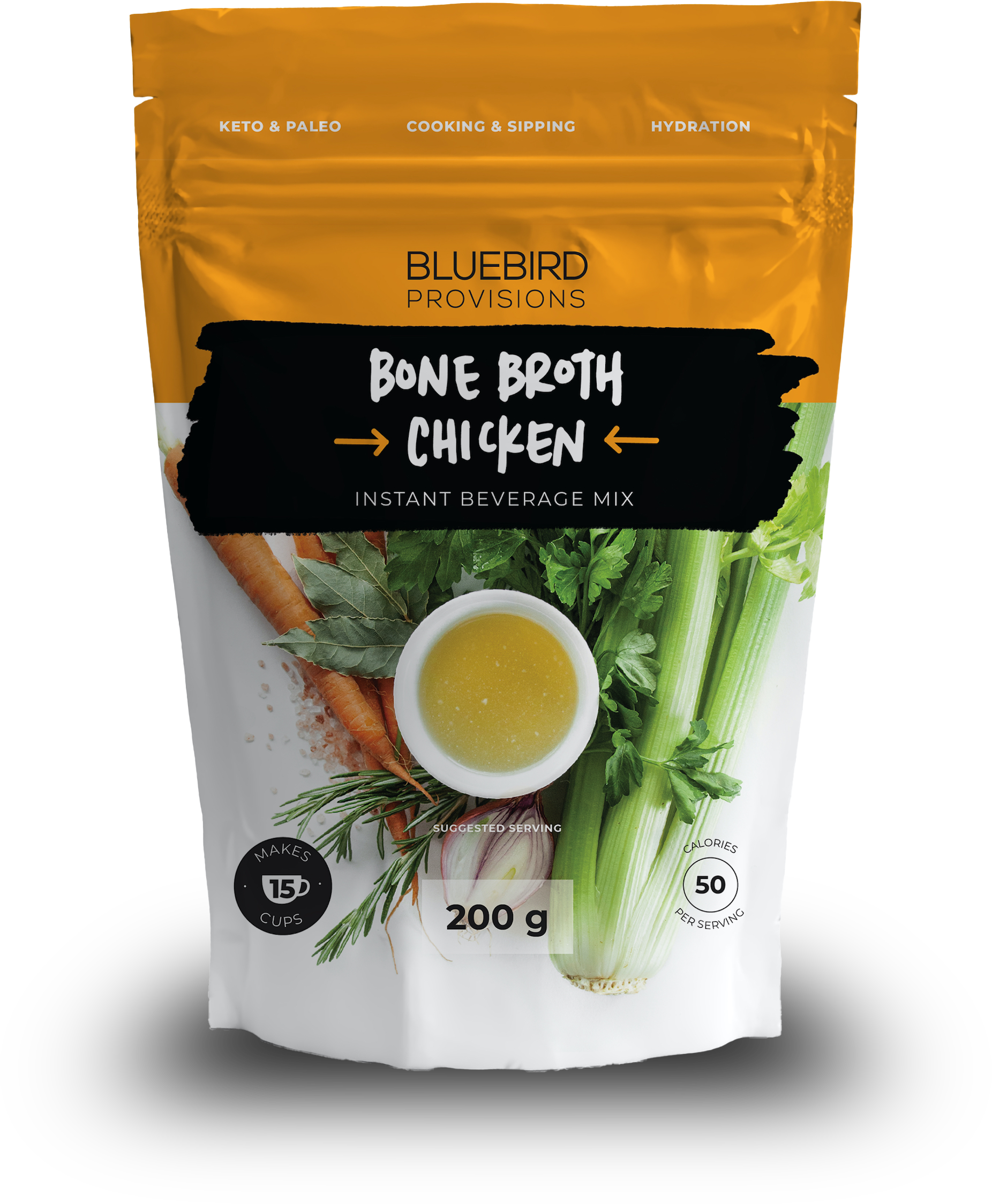
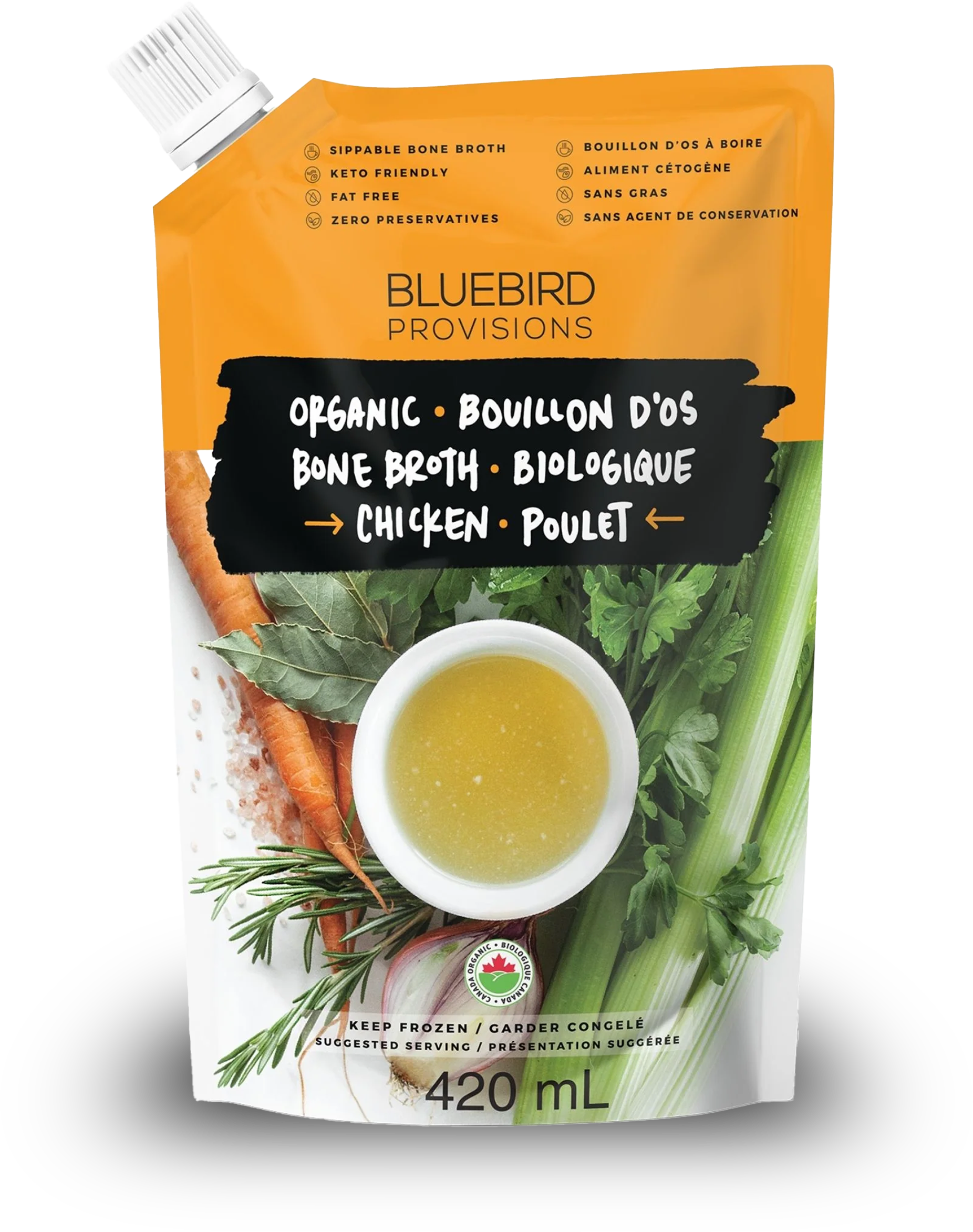




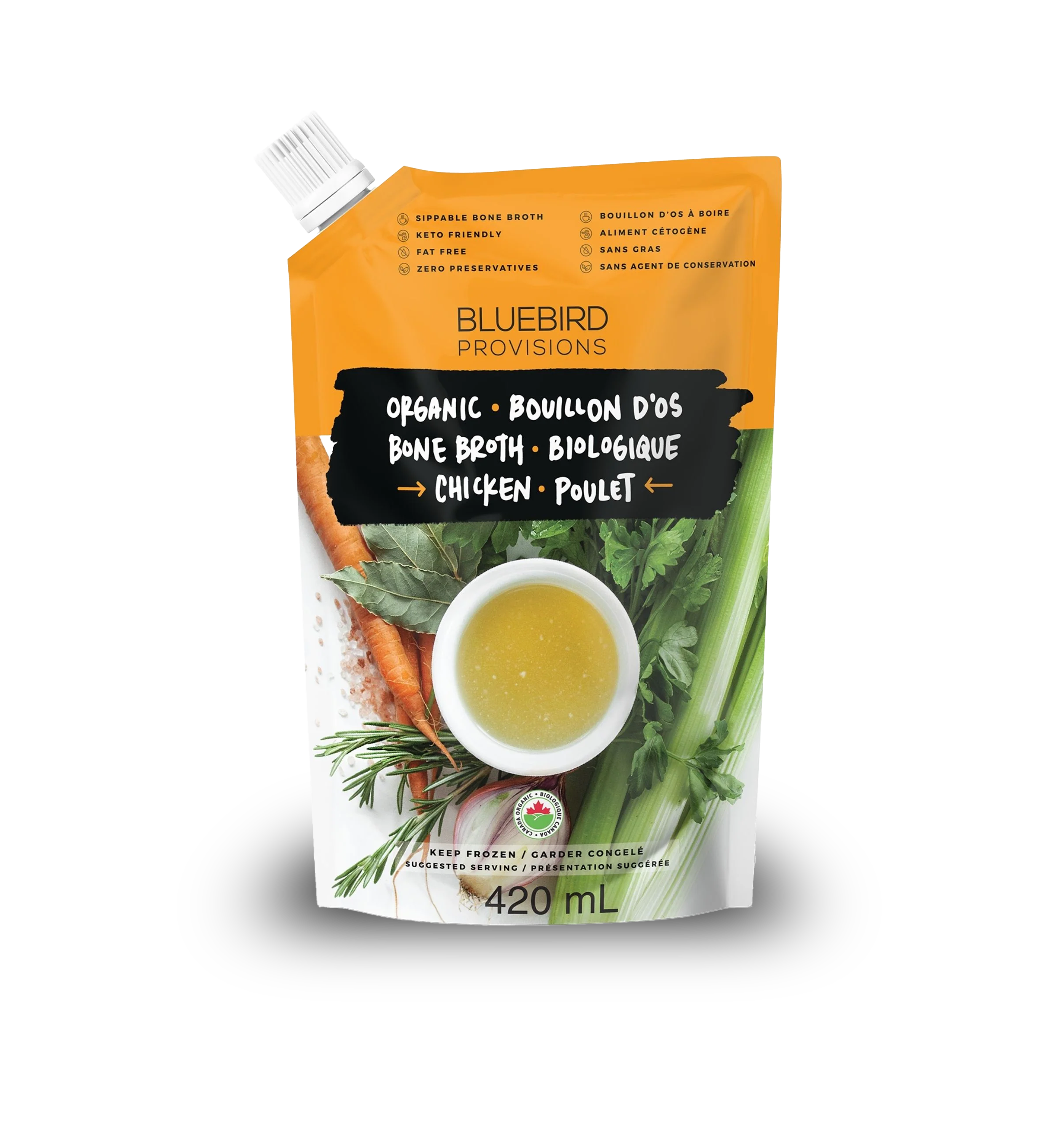



4 comments
Woops! Thanks for pointing out the typo Sadie. Fixed it now :)
connor
Connor at Bluebird Provisions
Dairy protein comes from cows – not coconuts LOL
Sadie
Thanks Holly I did not even think of adding that. I will add these to the list. Thanks so much!
Connor at Bluebird Provisions
Hi Connor
I have one more suggestion to thicken soups while adding plant based protein and fibre. Purée a can of rinsed cannellini beans with a cup of your broth until smooth and add it back into your soup. The flavour is mild and it adds a rich creamy texture.
Holly Legault
Leave a comment
This site is protected by hCaptcha and the hCaptcha Privacy Policy and Terms of Service apply.